bring、take 和fetch区别
- 格式:doc
- 大小:11.50 KB
- 文档页数:1
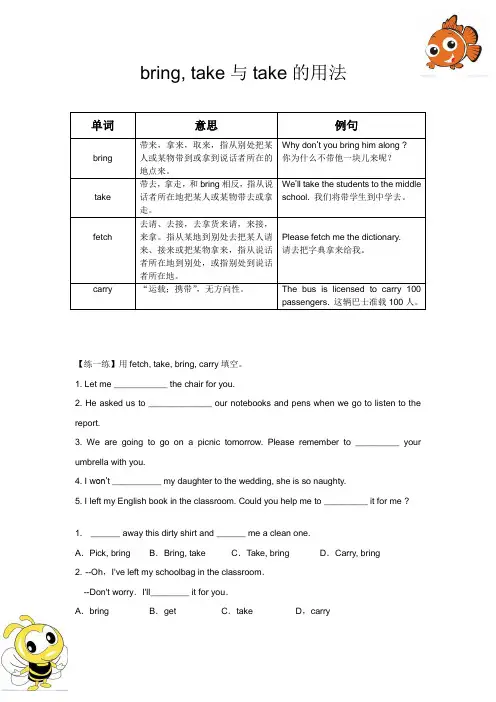
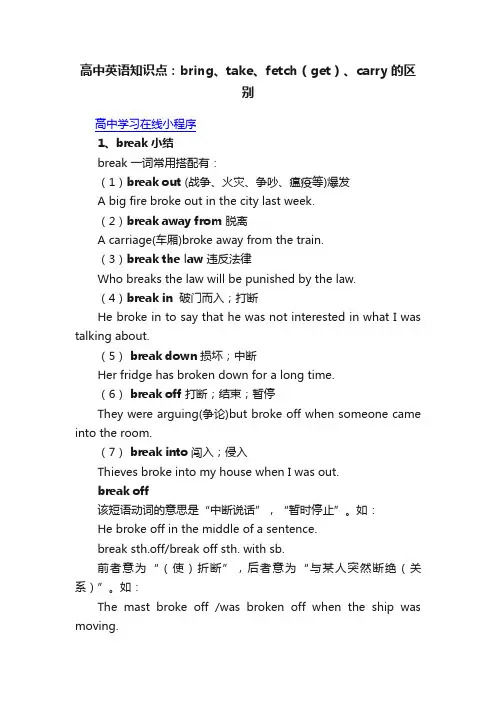
高中英语知识点:bring、take、fetch(get)、carry的区别高中学习在线小程序1、break 小结break 一词常用搭配有:(1)break out (战争、火灾、争吵、瘟疫等)爆发A big fire broke out in the city last week.(2)break away from 脱离A carriage(车厢)broke away from the train.(3)break the law 违反法律Who breaks the law will be punished by the law.(4)break in 破门而入;打断He broke in to say that he was not interested in what I was talking about.(5) break down 损坏;中断Her fridge has broken down for a long time.(6)break off 打断;结束;暂停They were arguing(争论)but broke off when someone came into the room.(7)break into 闯入;侵入Thieves broke into my house when I was out.break off该短语动词的意思是“中断说话”,“暂时停止”。
如:He broke off in the middle of a sentence.break sth.off/break off sth. with sb.前者意为“(使)折断”,后者意为“与某人突然断绝(关系)”。
如:The mast broke off /was broken off when the ship was moving.break out (战争、火灾、疾病、瘟疫等的)爆发①The American Civil War broke out in 1861.②Fire broke out in the neighbour last night.break out in (into)… 忽然(做出)……break out in laughter 突然放声大笑break in (强盗等)强行闯入break into 闯入;打碎(打破)成……break up 分开,分割2、bring短语归纳bring down(风)刮倒,降低(降落);bring up 养大,呕吐;bring about带来,引起;bring along捎来,带来,bring back 归还;bring out 拿出;bring in 赚(钱),带进,传入;bring on 端上(饭菜),引起(火灾),使……成长;[应用]副词填空①He felt terribly ill and brought ______ what he ate.②Surely the new railway will bring __ many changes in this less developed area.③Next time you come to China, be sure to bring ______your friends.④All the library books must be broug ht_______ before June20.⑤Selling newspapers brings ______ enough money for my schooling.⑥Enough water can bring the rice _______ .Key: ①up ②about ③along ④back ⑤in ⑥on3、bring/take/fetch(get)/carry①bring向着说话人的地方“带来;拿来”。
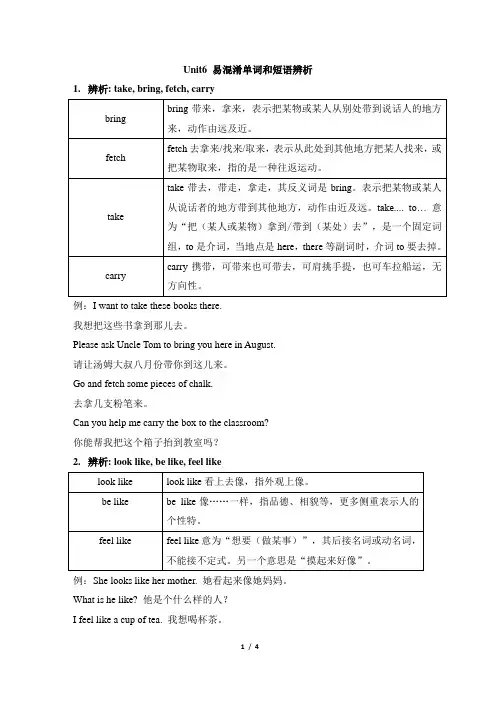
Unit6 易混淆单词和短语辨析1.辨析: take, bring, fetch, carry例:I want to take these books there.我想把这些书拿到那儿去。
Please ask Uncle Tom to bring you here in August.请让汤姆大叔八月份带你到这儿来。
Go and fetch some pieces of chalk.去拿几支粉笔来。
Can you help me carry the box to the classroom?你能帮我把这个箱子抬到教室吗?2.辨析: look like, be like, feel like例:She looks like her mother. 她看起来像她妈妈。
What is he like? 他是个什么样的人?I feel like a cup of tea. 我想喝杯茶。
It feels like silk.它摸起来像丝绸。
3.辨析: think about, think of, think over例:I’m thinking about a problem.我正在考虑一个问题。
He always thinks of others more than himself.他总是为别人考虑得多,为自己考虑得少。
You’d better think it over bef ore you do it.在你做这件事之前,你最好先好好考虑一下。
4.辨析: the number of, a number of例:The number of the students in our school is 2,000. 我们学校的学生人数为2000。
A number of students are playing on the playground. 许多学生在操场上玩耍。
5. 辨析: such as, for example例:I have been to a lot of Chinese cities, such as Beijing, Shanghai and Hangzhou.我去过中国的许多地方,比如北京,上海和杭州。
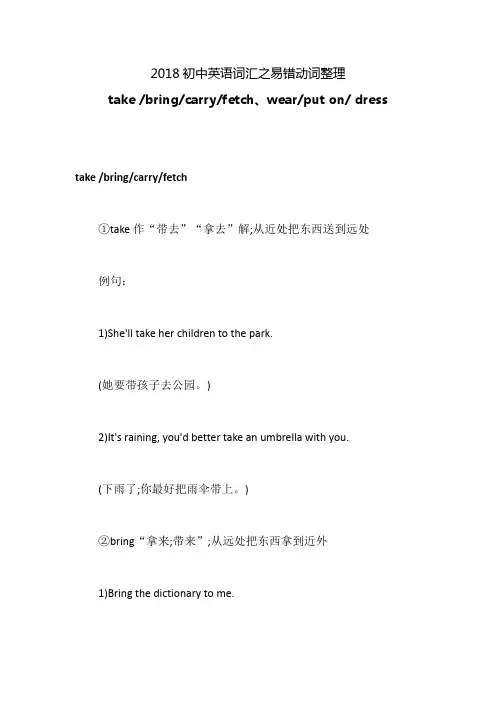
2018初中英语词汇之易错动词整理take /bring/carry/fetch、wear/put on/ dress take /bring/carry/fetch①take作“带去”“拿去”解;从近处把东西送到远处例句:1)She'll take her children to the park.(她要带孩子去公园。
)2)It's raining, you'd better take an umbrella with you.(下雨了;你最好把雨伞带上。
)②bring“拿来;带来”;从远处把东西拿到近外1)Bring the dictionary to me.(把字典拿给我。
)2)Please bring your report with you when you come tomorrow. (明天你来的时候,请把你的报告带来。
)③carry作“携带,带去;搬运”1)She always carries a red handbag.(她总是带一个红色手包。
)2)Please carry this TV set upstairs.(请把这台电视搬到楼上去。
)④fetch作“去…取来,拿来;叫某人来”1)The football is over there. Fetch it please.(足球在那边呢,请把它拿回来。
)2)Fetch the police at once. We've found the robber.(马上去叫警察来,我们已经发现那个抢劫的人。
)wear/put on/ dress①wear穿着,戴;留,表示“状态”是及物动词需加宾语例句:1)She always wears a pair of glasses.(她总是戴着一副眼镜。
)2)He wears a black jacket today.(今天他穿着一件黑色的夹克。
)②put on穿上,戴上,表示“动作”例句:。
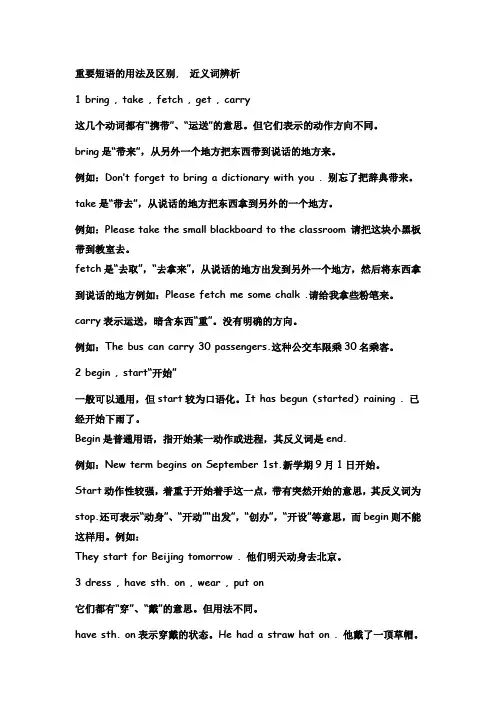
重要短语的用法及区别, 近义词辨析1 bring , take , fetch , get , carry这几个动词都有“携带”、“运送”的意思。
但它们表示的动作方向不同。
bring是“带来”,从另外一个地方把东西带到说话的地方来。
例如:Don’t forget to bring a dictionary with you . 别忘了把辞典带来。
take是“带去”,从说话的地方把东西拿到另外的一个地方。
例如:Please take the small blackboard to the classroom 请把这块小黑板带到教室去。
fetch是“去取”,“去拿来”,从说话的地方出发到另外一个地方,然后将东西拿到说话的地方例如:Please fetch me some chalk .请给我拿些粉笔来。
carry表示运送,暗含东西“重”。
没有明确的方向。
例如:The bus can carry 30 passengers.这种公交车限乘30名乘客。
2 begin , start“开始”一般可以通用,但start较为口语化。
It has begun(started)raining . 已经开始下雨了。
Begin是普通用语,指开始某一动作或进程,其反义词是end.例如:New term begins on September 1st.新学期9月1日开始。
Start动作性较强,着重于开始着手这一点,带有突然开始的意思,其反义词为stop.还可表示“动身”、“开动”“出发”,“创办”,“开设”等意思,而begin则不能这样用。
例如:They start for Beijing tomorrow . 他们明天动身去北京。
3 dress , have sth. on , wear , put on它们都有“穿”、“戴”的意思。
但用法不同。
have sth. on表示穿戴的状态。
He had a straw hat on . 他戴了一顶草帽。
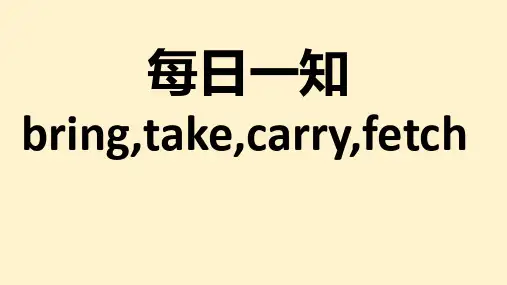
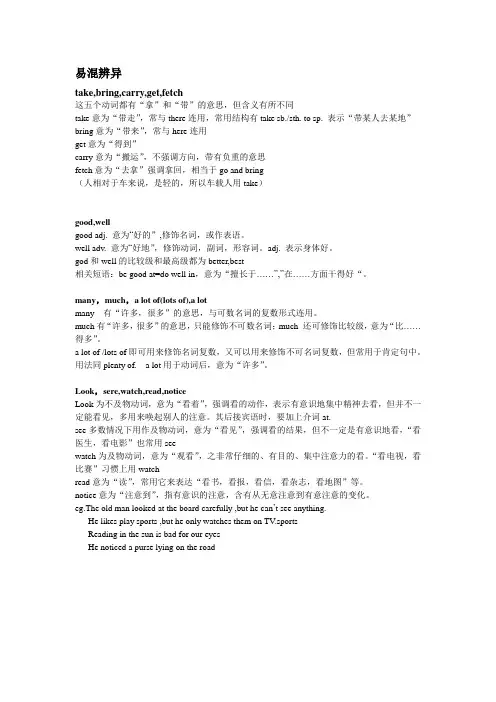
易混辨异take,bring,carry,get,fetch这五个动词都有“拿”和“带”的意思,但含义有所不同take意为“带走”,常与there连用,常用结构有take sb./sth. to sp. 表示“带某人去某地”bring意为“带来”,常与here连用get意为“得到”carry意为“搬运”,不强调方向,带有负重的意思fetch意为“去拿”强调拿回,相当于go and bring(人相对于车来说,是轻的,所以车载人用take)good,wellgood adj. 意为“好的”,修饰名词,或作表语。
well adv. 意为“好地”,修饰动词,副词,形容词。
adj. 表示身体好。
god和well的比较级和最高级都为better,best相关短语:be good at=do well in,意为“擅长于……”,”在……方面干得好“。
many,much,a lot of(lots of),a lotmany 有“许多,很多”的意思,与可数名词的复数形式连用。
much有“许多,很多”的意思,只能修饰不可数名词;much 还可修饰比较级,意为“比……得多”。
a lot of /lots of即可用来修饰名词复数,又可以用来修饰不可名词复数,但常用于肯定句中。
用法同plenty of. a lot用于动词后,意为“许多”。
Look,sere,watch,read,noticeLook为不及物动词,意为“看着”,强调看的动作,表示有意识地集中精神去看,但并不一定能看见,多用来唤起别人的注意。
其后接宾语时,要加上介词at.see多数情况下用作及物动词,意为“看见”,强调看的结果,但不一定是有意识地看,“看医生,看电影”也常用seewatch为及物动词,意为“观看”,之非常仔细的、有目的、集中注意力的看。
“看电视,看比赛”习惯上用watchread意为“读”,常用它来表达“看书,看报,看信,看杂志,看地图”等。
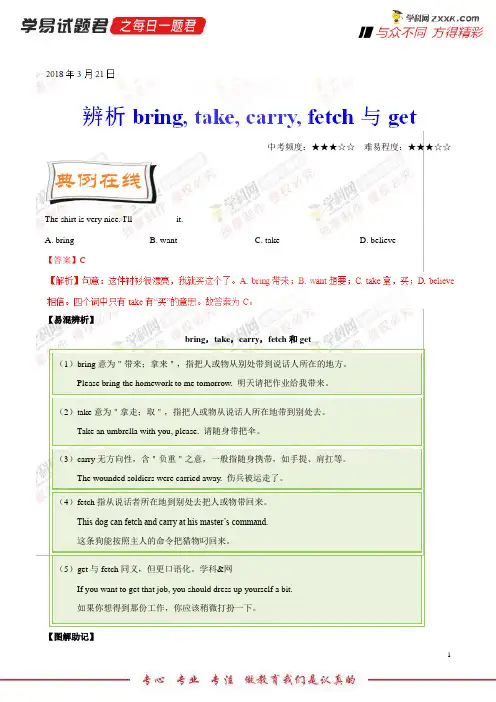
中考频度:★★★☆☆难易程度:★★★☆☆
The shirt is very nice. I'll _________ it.
A. bring
B. want
C. take
D. believe
【答案】C
【易混辨析】
bring,take,carry,fetch和get
(1)bring意为"带来;拿来",指把人或物从别处带到说话人所在的地方。
Please bring the homework to me tomorrow. 明天请把作业给我带来。
(2)take意为"拿走;取",指把人或物从说话人所在地带到别处去。
Take an umbrella with you, please. 请随身带把伞。
(3)carry无方向性,含"负重"之意,一般指随身携带,如手提、肩扛等。
The wounded soldiers were carried away. 伤兵被运走了。
(4)fetch指从说话者所在地到别处去把人或物带回来。
This dog can fetch and carry at his master’s command.
这条狗能按照主人的命令把猎物叼回来。
(5)get与fetch同义,但更口语化。
学科&网
If you want to get that job, you should dress up yourself a bit.
如果你想得到那份工作,你应该稍微打扮一下。
【图解助记】
1。
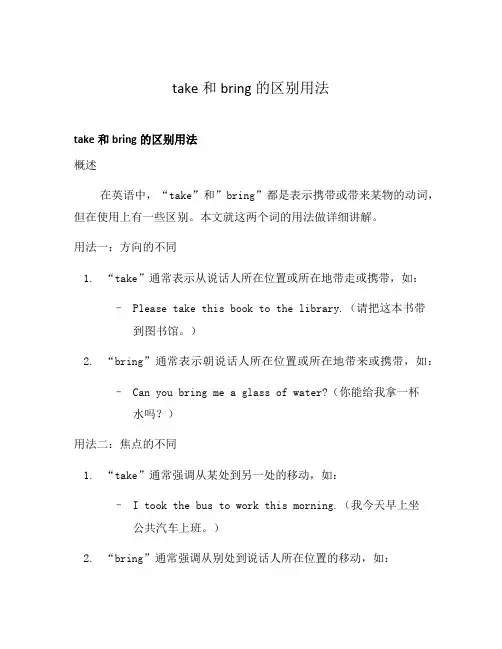
take和bring的区别用法take和bring的区别用法概述在英语中,“take”和”bring”都是表示携带或带来某物的动词,但在使用上有一些区别。
本文就这两个词的用法做详细讲解。
用法一:方向的不同1.“take”通常表示从说话人所在位置或所在地带走或携带,如:–Please take this book to the library.(请把这本书带到图书馆。
)2.“bring”通常表示朝说话人所在位置或所在地带来或携带,如:–Can you bring me a glass of water?(你能给我拿一杯水吗?)用法二:焦点的不同1.“take”通常强调从某处到另一处的移动,如:–I took the bus to work this morning.(我今天早上坐公共汽车上班。
)2.“bring”通常强调从别处到说话人所在位置的移动,如:–She will bring the cake to the party.(她会把蛋糕带到派对上。
)用法三:参照点的不同1.“take”的参照点通常是说话人自身或所在位置,如:–Take your umbrella with you.(带上你的雨伞。
)2.“bring”的参照点通常是说话人所在的位置,如:–Please bring your ID card when you come.(请你来的时候带上你的身份证。
)用法四:物品的不同1.“take”通常用于将物品从某处带走,如:–He took the newspaper out of the bag.(他把报纸从包里拿出来。
)2.“bring”通常用于将物品带到说话人所在位置,如:–Could you bring me a pen from your office?(你能从你的办公室给我带一支笔来吗?)用法五:与人相关的不同1.“take”可以指带走或携带某人,如:–She took her children to the park.(她带着她的孩子去了公园。
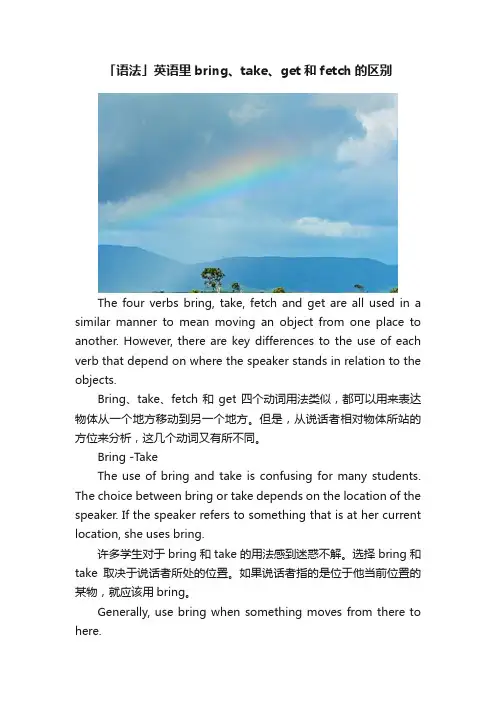
「语法」英语里bring、take、get和fetch的区别The four verbs bring, take, fetch and get are all used in a similar manner to mean moving an object from one place to another. However, there are key differences to the use of each verb that depend on where the speaker stands in relation to the objects.Bring、take、fetch和get四个动词用法类似,都可以用来表达物体从一个地方移动到另一个地方。
但是,从说话者相对物体所站的方位来分析,这几个动词又有所不同。
Bring -TakeThe use of bring and take is confusing for many students. The choice between bring or take depends on the location of the speaker. If the speaker refers to something that is at her current location, she uses bring.许多学生对于bring和take的用法感到迷惑不解。
选择bring和take取决于说话者所处的位置。
如果说话者指的是位于他当前位置的某物,就应该用bring。
Generally, use bring when something moves from there to here.一般来说,当表示某物从远处到近处时,应该使用bring。
I'm glad you brought me to this shop. It's great!非常高兴你带我来这个商店。
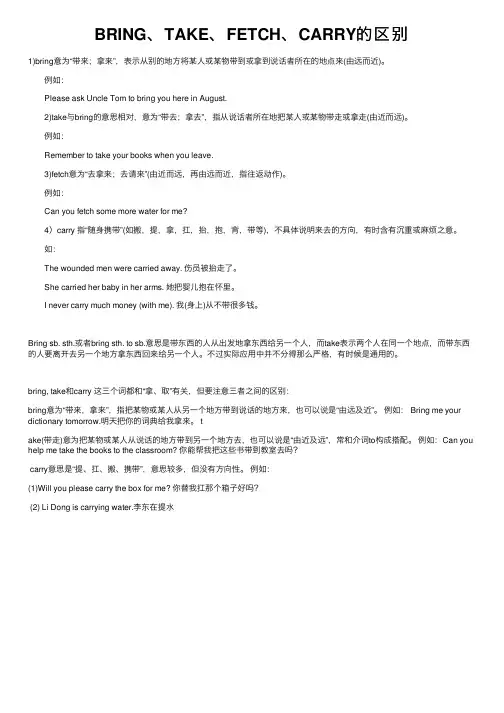
BRING、TAKE、FETCH、CARRY的区别1)bring意为“带来;拿来”,表⽰从别的地⽅将某⼈或某物带到或拿到说话者所在的地点来(由远⽽近)。
例如: Please ask Uncle Tom to bring you here in August. 2)take与bring的意思相对,意为“带去;拿去”,指从说话者所在地把某⼈或某物带⾛或拿⾛(由近⽽远)。
例如: Remember to take your books when you leave. 3)fetch意为“去拿来;去请来”(由近⽽远,再由远⽽近,指往返动作)。
例如: Can you fetch some more water for me? 4)carry 指“随⾝携带”(如搬,提,拿,扛,抬,抱,背,带等),不具体说明来去的⽅向,有时含有沉重或⿇烦之意。
如: The wounded men were carried away. 伤员被抬⾛了。
She carried her baby in her arms. 她把婴⼉抱在怀⾥。
I never carry much money (with me). 我(⾝上)从不带很多钱。
Bring sb. sth.或者bring sth. to sb.意思是带东西的⼈从出发地拿东西给另⼀个⼈,⽽take表⽰两个⼈在同⼀个地点,⽽带东西的⼈要离开去另⼀个地⽅拿东西回来给另⼀个⼈。
不过实际应⽤中并不分得那么严格,有时候是通⽤的。
bring, take和carry 这三个词都和“拿、取”有关,但要注意三者之间的区别:bring意为“带来,拿来”,指把某物或某⼈从另⼀个地⽅带到说话的地⽅来,也可以说是“由远及近”。
例如: Bring me your dictionary tomorrow.明天把你的词典给我拿来。
take(带⾛)意为把某物或某⼈从说话的地⽅带到另⼀个地⽅去,也可以说是“由近及远”,常和介词to构成搭配。
bring,take,fetch,carry与get的区别用法
一、bring 意为“带来,取来”,指把某物从别处带到说话处。
常用句型 bring sb. sth./bring sth. to sp.。
如:
Father brought me a present from Australia.I like it a lot.父亲从澳大利亚给我带来了一个礼物。
我很喜欢它。
二、take意为“带去,拿去”,指把某物从说话处带到别处,与bring所表示的方向相反。
常用句型 take sth. to sp.。
如:指带走,把东西带走或拿走,如:
Please take the letter to the post office.请把这封信送到邮局去。
三、carry意为“拿;提;扛”,没有方向性,但有负重的含义。
如:
Let me carry the box for you.请让我替你拿这个箱子。
四、get/fetch 表示到某地去把某物取来,强调动作的往返。
如:
She has gone to fetch water.她去打水去了。
get 是常用词,多用于口语, 与fetch 同义。
如:
Go and get some water. 去打些水来。
来源:网络。
本文版权归原创作者所有。
若侵联删。
相似词语辨析bring,take,carry,fetch相似词语辨析bring,take,carry,fetch相似词语辨析bring,take,carry,fetch这四个词都是动词,都含有带或拿的意思,但使用场合各不相同。
Bring作带来、拿来解;take是bring的对语,作带去、拿去解。
例:Next year you may bring your family over from England.明年你可以把你的'家属从英国带来。
Why dont you bring your girl friend to the party?你为什么不把你的女友带来参加宴会?Next time dont forget to brig me a copy of your work.下次不要忘了把一份您的作品带给我。
Please take these books to the library for me.请把这些书替我带到图书馆去。
Take the box away,please.请把盒子拿走。
Carry表示运载、携带之意,运送的方式很多,可以用车、船,也可以用手甚至用头;fetch则表示去拿来(go and bring)的意思。
例:They are carrying some paintings to the art gallery.他们正在把一些画带到艺术馆去。
This bus is licensed to carry 100 passengers.这辆巴士规定乘载一百人。
Please fetch me the documents in that room.请到那间房间去把那些文件拿来给我。
bring和take的区别
bring和take的区别在于二者意思是不同的,bring是带来的意思,take是带去的意思。
两者方向相反,用带来还是带去需要要站在主语的角度去考虑。
1.含义不同
(1)take带去(从这里带到另一个地方)
I'll take you home.我会带你回家的。
(2)bring带来(从另一个地方带到这里)
Would you like me to bring anything to the party?你希望我带什么东西来派对吗?
2.用法不同
(1)take 简单说就是把某个东西或某人,从这里带去另一个地方。
Don't forget to take your umbrella.别忘记带走你的伞。
(2)bring 简单说就是把某个东西,从另一个地方带来这里。
Would you like me to bring anything to the party?你希望我带什么东西来派对吗?
3.主动性不同
(1)take可以表示主动的移动。
I'm taking the kids to the cinema tonight.今晚我要带孩子们去看电影。
(2)bring则表示跟随一起移动。
Would you like to come with usand bring Susie?你愿意和我们带上苏西跟我们去吗?。
2014崇左中考英语词语辨析:bringtakefetchgetcarry中考频道在考试后及时公布各科中考试题答案和中考作文及试卷专家点评,请广大考生家长关注。
时光飞逝,暑假过去了,新学期开始了,不管情愿与否,无论准备与否,我们已走进初三,走近我们的梦!祝愿决战2014中考的新初三学员能加倍努力,在2014年中考中也能取得优异的成绩。
bring/ take/ fetch/ get/ carry都有“拿”的意思,但用法差别很大,切勿混同。
Ⅰ.bring“拿来、带来”强调从别处带某人或某物来到说话人所在地。
如:The teacher asked the students to bring their dictionaries to the class.Ⅱ.take“拿走、带走”强调人或事物离开说话人所在地,与bring的关系相当于go与come的相对关系。
如:May I take this magazine home?Ⅲ.fetch“去取来、去拿来” 指去取了东西又回来这一往返过程,相当于go and bring,但不同于bring,如:Please fetch me some chalk.get与fetch意思相似,多用于口语。
如:Go and get/fetch some water.Ⅳ.carry“携带、搬运”强调某物从甲地移至乙地,带有物体随身移动但无固定方向。
如:① He carried the box upstairs.另外空气、水、电携带物也用carry.如:① The boat was carried by ocean currents to a small island.这船被大洋的水流飘至一小岛。
2014高考英语词语辨析:bringtakefetchget
高考频道在考试后及时公布各科高考试题答案和高考作文及试卷专家点评,请广大考生家长关注。
时光飞逝,暑假过去了,新学期开始了,不管情愿与否,无论准备与否,我们已走进高三,走近我们的梦!祝愿决战2014高考的新高三学员能倍加努力,在2014年高考中也能取得优异的成绩。
bring:带来。
例如:
例101:Bring the book here tomorrow.
take:拿走。
例如:
例102:Don’t take the magazines out of the reading-room.
fetch:去拿来。
例如:
例103:Go downstairs and fetch me some water.
get:去拿来。
与fetch同义,但较口语化。
例如:
例104:She got him a good doctor. (她为他请来了一位好医生。
)
carry:携带。
指随身携带,如捧、抱、扛、运等。
例如:
例105:He carried a bag of rice on his shoulder.
例106:He often carries a pocket dictionary when he goes out.
(他出门时经常带着一本袖珍词典。
)
2013高考英语试题分类小结篇:状语从句与并列句2013高考英语试题分类小结篇:名词性从句2013高考英语试题分类小结篇:动词与动词短语
2013浙江英语试题及答案解析2013辽宁英语试题及答案解析。
transport的同义词辨析transport有运输;传播;流放;激动等意思,那么你知道transport 的同义词有哪些吗?下面店铺为大家带来transport的同义词及辨析,供大家学习。
transport同义词:bring, carry, take, fetch, get, convey, transporttransport同义词辨析:这些动词均有"带,拿,取"之意。
bring 指从某处把人或物带到或拿到说话者所在的地点,强调方向,不着重方式。
carry 指把物品从一个地方带到另一个地方,不涉及方向,只强调方式。
take 指从说话人或说话人心目中所在处把某人或某物带离开,带到离说话者有一定距离的地方,与bring的方向正相反,侧重方向,不着重方式。
fetch 指一往一返,相当于go and bring,去取了东西或带人再返回到出发处。
get 口语用词,与fetch基本同义,语气随便。
convey 指通过中间人传递信息,或以某种方式把人或物送到目的地。
transport 指使用车辆或机械设备把人或货物从一处运载到另一处。
transport的例句:1. There's no petrol, so it's very difficult to transport goods.没有汽油,因此很难运输货物。
2. The missiles emerge from the underbelly of the transport plane.导弹从那架运输机的底部飞了出来。
3. The extra money could be spent on improving public transport.多余的资金可以用于改善公共交通系统。
4. The sudden onset of winter caused havoc with rail and air transport.冬天的突然降临让铁路和航空运输系统陷入混乱。